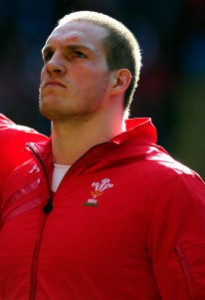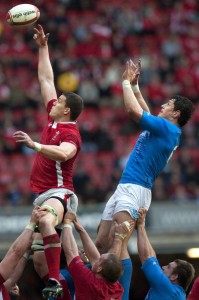By Paul Williams
WALES KEPT their bid for a third Grand Slam in seven years on track by beating Italy in Cardiff on Saturday. Here’s the lowdown on the good, and not so good, of their performance. Stay tuned for the verdict on Wales’ final game against France next week.
Domination
Much will be made of Wales’ failure to put 25+ points on Italy. In truth, such winning margins are very rare between two teams ranked in the IRB’s top 12. But Wales’ failure to deliver a Hollywood scoreline should not be dwelled upon.
Barring certain aspects of the breakdown, Wales dominated every aspect of the game. They had 62% of the territory and 68% of the possession. They made seven times more line breaks than the Italians and beat 15 times the amount of defenders. Italy were forced to make 133 tackles, Wales just 48 (incredibly, at half-time Wales had just made 14 tackles, that’s not even one per player).
Gethin is not a captain
Gethin Jenkins is many things. He is probably the greatest loosehead ever to play for Wales. No, that isn’t quite true. Gethin Jenkins isn’t just a loosehead. He’s an openside, blindside, No 8, tackling, jackling, grubber-kicking, loosehead who has redefined the role of a modern No 1. However, the one thing that Gethin Jenkins isn’t is a Test captain.
The role of an international captain is often derided. The fact that most teams now have a defensive captain, forwards captain and lineout captain etc means that the role of a ‘team’ captain is often seen of limited importance. But this isn’t true. The ‘team’ captain is in charge of the most important decision on the pitch – penalty options and what to do with them. Penalties decide Test matches and Jenkins’s decision to kick to touch twice in the first 22 minutes was naïve. Wales scored no points directly from the ensuing lineouts and squandered six kickable points in what was a low-scoring first half.
Some may point to Jenkins’s decision to take a quick penalty in the 77th minute as showing rugby intelligence. It was; it led to Wales’ second try. But that was a ‘playing’ decision, not a captaincy decision. Jenkins was obviously given the captaincy based on his international experience, but when it comes to choosing a captain it’s not just the amount of caps that matters, it’s the head that wears them.
Cuthbert overshadows North
There are few players who are able to overshadow George North – he casts quite a shadow. But against Italy, Alex Cuthbert did just that. Cuthbert was very impressive against the Italians. He carried the ball a total of 101 metres. That’s a long way. To put it in perspective the whole Italian team only carried the ball 163 metres. Cuthbert ran some very direct lines against Italy (making three clean breaks and beating five defenders) and his desire to look for the ball in the central channels caused the Italian defence no end of problems. His insistence in looking for work away from the wing meant that the Italians now had to worry about Jamie Roberts, Jonathan Davies and Cuthbert, all of whom require ‘double tackling’ – not as a defensive option but as a necessity.
Whilst Cuthbert’s offensive display will draw praise, his defensive display should not be overlooked. He executed three solid tackles, missed none and was as defensively organised as any of the Welsh back-line. But perhaps the greatest testament to Cuthbert’s performances against Italy, and indeed Scotland, Ireland and England, is the absence of Shane Williams’s name from the discussion. Williams is the greatest player to play for Wales in the modern era. Yet I haven’t heard one supporter, player or pundit longing for his return to the team. Even though it was meant in a very different manner, Ben Cohen’s ‘Shane Who?’ comment has finally come to pass. (I think I may have just committed rugby heresy again).
Tipuric is not Warburton
Justin Tipuric’s performance will draw many plaudits. His link play was impressive, and his tackling exemplary – only Lydiate made more tackles in the Welsh XV. Tipuric is undoubtedly a very talented player. He has the acceleration, top-end speed and handling skills of a centre and the comparisons with Martyn Williams are just – but the comparisons with Sam Warburton are not.
Warburton was as missed against Italy as he was against Scotland. Some of Tipuric’s offensive skill-set undoubtedly caught the eye, but it was Warburton’s ‘unsighted’ workload that Wales missed most. Warburton doesn’t just slow the opposition ball down, he speeds the Welsh ball up. In his absence the Italian back row dominated the breakdown. Alessandro Zanni and Simone Favaro helped themselves to a lot of Welsh ball – it was like a Tuscan buffet at times. The result was that Wales conceded more turnovers against Italy than they did against Ireland, Scotland or England. Wales were lucky that Italy’s limited half-back combination of Fabio Semenzato and Kris Burton meant that the Azzuri weren’t able to profit from turnover ball, but the same will not be true of France. Wales need Warburton to be fit to face the French.
Ian Evans has overtaken Alun Wyn Jones
There, I’ve said it. Ian Evans has become more important to Wales than Alun Wyn Jones. It seems sacrilegious to suggest that a Welsh second-row forward can outperform Jones, but it is true. Ian Evans has been one of Wales’ standout performers during the Six Nations.
Along with Ryan Jones, he is one of Wales’ most secure ball-carriers. His ball management in contact is superb. With his shoulders forward and the ball always tucked in behind and away from the tackler, he rarely turns the ball over. He carried the ball eight times against Italy and whilst he rarely makes big, flashy 20-yard bursts, his ability to make regular five-yard carries is a valuable asset to Wales – at 6ft 8in and 18st 5lb he only has to fall over and he crosses the gain-line.
Evans’s return to international rugby has meant that Gatland now has more Test-standard locks at his disposal than any other coach in world rugby. Even the SANZAR countries don’t have access to locks of the standard of Evans, Alun Wyn Jones, Luke Charteris, Bradley Davies and Ryan Jones. So there it is, Evans is now of more value to Wales than Alun Wyn Jones. And while I’m in the mood for committing rugby heresy, I also think Charteris is more important to Wales than Alun Wyn Jones. Rugby hell, here I come.








